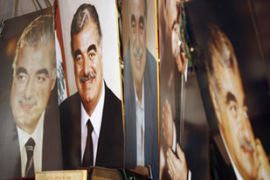Hariri murder suspects identified
UN report also warns that Lebanon’s security situation would hamper investigation.

The report concluded that “individuals using six mobile cellular telephone SIM cards acted in a co-ordinated manner to conduct surveillance on Rafiq al-Hariri in the weeks prior to the assassination”.
“A detailed analysis of the use of these cards on the day of the assassination indicates that these individuals played a critical role in the planning and execution of the attack itself, as demonstrated by their movements and call patterns,” it said.
The report said the enquiry panel also completed an extensive review of information related to Ahmed Abu Adass, the individual who appeared in the video claim of responsibility for the al-Hariri murder.
Investigators said that Adass was not the suicide bomber in the report, but was either “forced or duped into recording the video claim of responsibility and then presumably killed, or that he willingly recorded the video with others belonging to a wider extremist group”.
Security situation
The report also expressed concern about the deteriorating security environment in Lebanon over the past few months.
“The deterioration in the political and security environment is likely to have a negative effect on the commission’s activities in the coming months,” it warned.
|
“The deterioration in the political and security environment is likely to have a negative effect on the Commission’s activities in the coming months” UN report |
The report, made available to the 15 members of the UN Security Council, cited the ongoing fighting between the Lebanese army and Islamic fighters as well as the assassination of Lebanese anti-Syrian politician, Walid Eido.
It also referred to the attack on a convoy of UN peacekeepers that left six dead in south Lebanon in June.
The Brammertz panel said its next reporting period would be “particularly active” in carrying the priorities identified as a result of the consolidation effort, which also covered findings in the probes of 17 other attacks against anti-Syrian Lebanese targets, including the Eido case.
The first UN chief investigator, Germany’s Detlev Mehlis, said the killing’s complexity suggested the Syrian and Lebanese intelligence services played a role in al-Hariri’s assassination.
Four Lebanese generals, senior pro-Syrian security chiefs, have been under arrest for 20 months, accused of involvement in al-Hariri’s murder.
Brammertz has not echoed Mehlis’ suggestion, and did not provide any clues to those who may have been involved. He said Syria and other states have continued to provide “mostly positive responses” to requests for assistance.